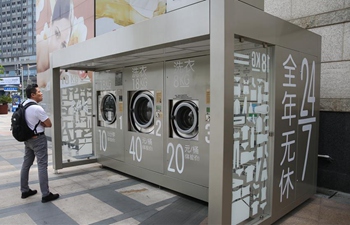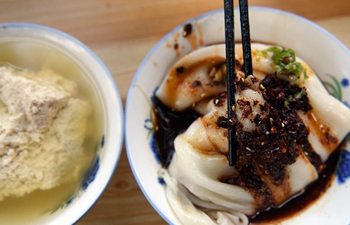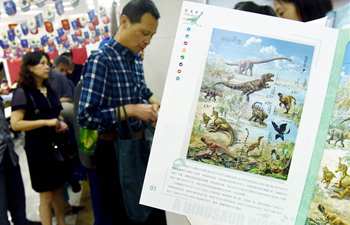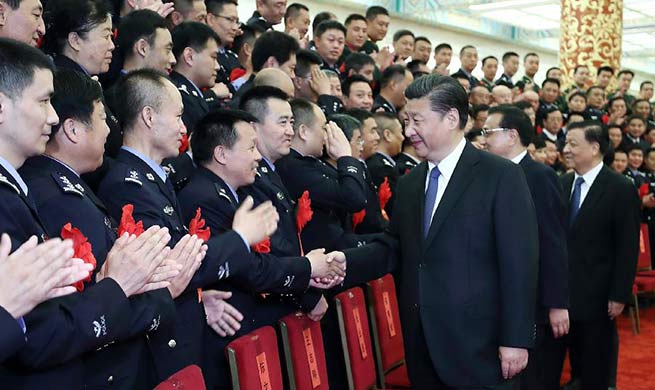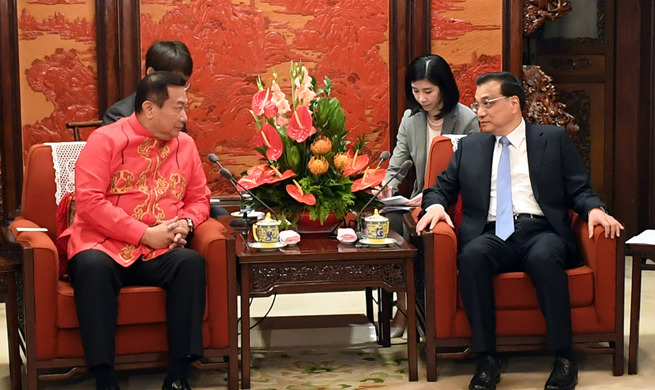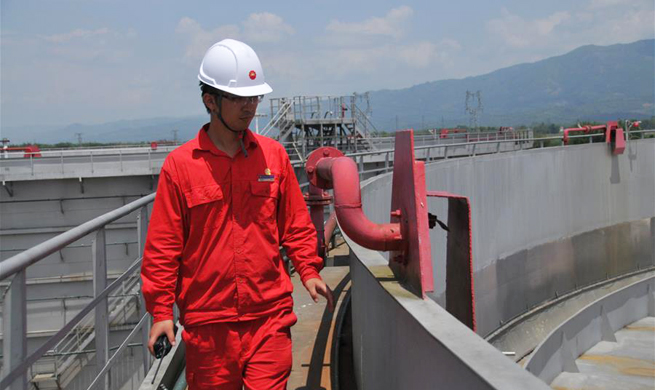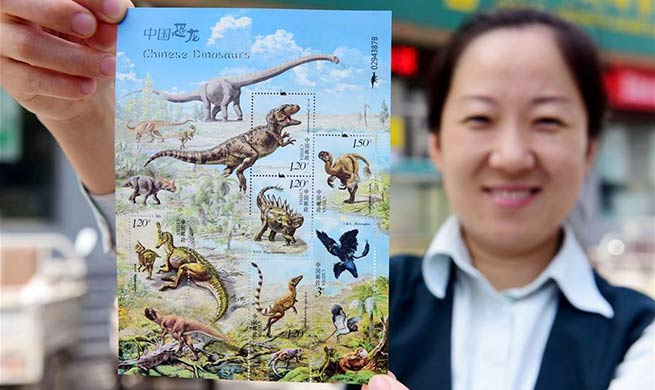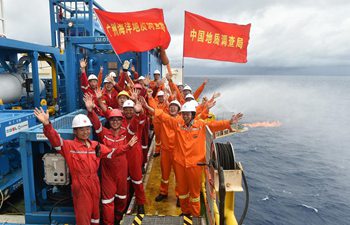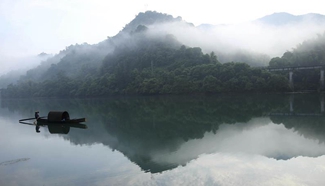TAIPEI, May 19 (Xinhua) -- A notice pasted on the wall of a once-popular restaurant in Taipei reads: Thanks to our "benevolent" administrators, we will be shut down from May 25.
A wave of similar closures have occurred over the past year in Taipei, Kaohsiung and many of the other destinations across the island once frequented by tourists. The whole tourist industry in Taiwan is struggling.
At the popular attractions of Ali Mountain and Sun Moon Lake, favorite haunts for Chinese mainland tourists, the paths are empty, boats are stationary, and many vendors have seen few or even no customers the whole day.
On the road, nearly one-third of the 17,300 tourist buses in Taiwan stand unused, with over 3,000 for sale at a loss.
The lull follows the election of Taiwan's new leader Tsai Ing-wen, who assumed office last May. Tsai has refused to adhere to the 1992 Consensus, angering people on both sides of the Strait.
Data from the island's immigration department showed that mainland visitors dropped by 50.2 percent in the first four months this year, with group tours plummeting 61 percent yearly.
It is estimated that this has resulted in losses of at least 50 billion new Taiwan dollars (1.7 billion U.S. dollars) in tourism revenue for the island.
Taiwan's current Democratic Progressive Party (DPP) administration had rolled out incentives to attract visitors from Southeast Asia, but the gap left by the mainland has been almost impossible to fill.
"They did not help at all," Cheng Yu-ping, chairman of YUYUPAS Ltd., which sells Oolong tea and coffee, two of Ali Mountain's major products, told Xinhua.
"The increase in the number of Southeast Asian tourists cannot make up the gap left by Chinese mainland tourists, but the DPP is ignoring this state of affairs and argues that the 'quality' of tourism has increased and the air has become cleaner with fewer mainland visitors. This kind of attitude is worrying," said Chiu Kun-shuan, professor at the Graduate Institute of East Asian Studies in Chengchi University, Taipei.
"If the administration continues to rock the boat, cross-Strait relations will only get worse," he added.
SOCIETY TEARING APART
The tourist industry is not the only one feeling the pinch.
In late April, a statue in Yangminshan Park, Taipei, of late Taiwan leader Chiang Kai-shek was beheaded and covered with red spray paint.
A pro-independence group released a statement claiming responsibility for the act, saying it was in response to a similar beheading of a statue of Japanese hydraulic engineer Yoichi Hatta in Tainan on April 16.
Taiwan seems torn.
Over the past year, the DPP administration has not ceased its promotion of de-sinicization and "Taiwan independence" activities in the island's cultural sector.
Taiwan's education authority last year abolished a draft that proposed changes to the wording of some textbooks to better reflect history by altering "Japanese governance" to "Japanese colonization" and "[Chinese] takeover of Taiwan" to "the recovery of sovereignty over Taiwan."
Last September, two statues donated by actor Jackie Chan to a new museum in Taiwan were splashed with paint and daubed with anti-China vitriol.
Celebrations to commemorate the aniversary of the birth of Sun Yat-sen, who led the revolution that ended imperial rule in China, as well as Zheng Cheng-gong, a Ming dynasty warlord that "recovered Taiwan" from the Dutch were also downgraded, or canceled, triggering strong backlash from the public.
"All of the DPP administration's cultural and educational policies are based on 'transitional justice'," said Hu Yu-wei, professor at the Chinese Culture University in Taiwan.
"Transitional justice" refers to efforts to reverse what the DPP describes as the "legacy of injustices from the period of authoritarian KMT rule over Taiwan."
"The public do not support the politicization of cultural issues. They have seen no constructive progress in society -- just political struggles," Hu said.
Kuomintang legislator Chen Shei-saint slammed Tsai for being incapable of solving problems. "Take education for example, the DPP abolished the textbook draft as soon as they took power, and they still haven't offered an alternative. Taiwan is tearing apart," Chen said.
According to a poll conducted by Taiwan's policy foundation think tank, 42 percent of the 1,074 respondents, age 20 and above, were dissatisfied with the DPP administration's transitional justice drive, while only 15.7 percent were satisfied. In terms of youth-related policies, 64.9 percent are unhappy, in contrast to the 13.5 percent who are satisfied.
ENDLESS PROTESTS
The DPP administration has put forward multiple bills to "promote reform" since it took charge in May last year.
However, most of the bills, such as those to reform the pension program, new work rules, judicial reform as well as "forward-looking infrastructure investment program," have all wound up in endless chaos.
Since September, there have been multiple protests against the proposed pension reform.
The draft proposes that the age for a full pension should be increased from 60 to 65, alongside a gradual increase of the insurance premium to about six percent, with military personnel, public servants and teachers expected to see their pension benefits greatly shrink should the proposal be approved.
The new work rules have been met with an even stronger backlash. Multiple polls indicate that as many as 70 percent of Taiwanese workers were dissatisfied with the new work rules, which mandate a regular day off and one flexible rest day per week. In the meantime, employers are also complaining of the higher costs caused by the rigid new work rules.
Tsai and the DPP administration's approval rate has therefore continued to fall. Even a poll by pro-DPP media showed that for major issues including pension reform, new work rules and energy policies, the administration's approval rate was only 20 percent.
Almost 60 percent of Taiwanese are unhappy with the performance of the current administration, according to a poll released by the Taiwanese Public Opinion Foundation in April.
"Taiwan's real problem lies in economics rather than this 'transitional justice.' The administrators should be aware of that and establish a transparent legal system to attract investment. Or, Taiwan will remain in a quagmire," said Kuan Chung-ming, professor with the Institute of Economics in Taiwan.
"The whole world is striving to lift economic performance to improve the livelihood of its people, but Taiwan only focuses on political struggles, this is our biggest tragedy," said Lee Lai-hsi, chairman of Taiwan's civil servants association.
STABLE CROSS-STRAIT RELATIONSHIP WANTED
Many experts and legislators lay the blame on Tsai's refusal to adhere to the 1992 Consensus as the reason Taiwan has found itself in its current predicament.
"A stable cross-Strait relationship is the principal foundation for Taiwan's development. If we err from the status quo, the island's economy and trade will be severely affected," said legislator Tseng Ming-chung.
"The current cross-Strait relationship is like driving in a dark tunnel and can easily hit the wall. What will happen if we lose the huge Chinese mainland market?" Asked Lin Yu-fang, with Taiwan's policy foundation think tank.






